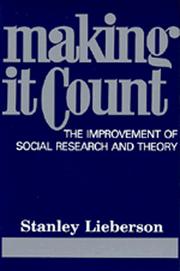| Listing 1 - 2 of 2 |
Sort by
|

ISBN: 1282355317 9786612355318 0520908422 9780520908420 0520053508 0520060377 9780520060371 9781282355316 661235531X Year: 1987 Publisher: Berkeley, Calif. University of California Press
Abstract | Keywords | Export | Availability | Bookmark
 Loading...
Loading...Choose an application
- Reference Manager
- EndNote
- RefWorks (Direct export to RefWorks)
This title reexamines and reconsiders the model of empirical research underlying most empirical work. The goal is neither a whitewash nor capital punishment, but rather it is to reform and mold empirical research into an activity that contributes as much as possible to a rigorous understanding of society. Without worrying about defining science or even determining the essence of the scientific enterprise, the goal is one that pools together logical thinking and empirically determined information. One of the fundamental issues to be addressed in this volume: Are there questions currently studied that are basically unanswerable even if the investigator had ideal nonexperimental data? If so, what are the alternative questions that can be dealt with successfully by empirical social research, and how should they be approached? In the chapters ahead, it will be important to keep in mind this doctrine of the undoable. Of course, one cannot simply mutter ";undoable"; when a difficult obstacle is encountered, turn off the computer, and look in the want ads for a new job-or at least a new task. Instead, it means considering if there is some inherent logical reason or sociological force that makes certain empirical questions unanswerable. There are four types of undoable questions to consider: those that are inherently impossible; those that are premature; those that are overly complicated; and those that empirical and theoretical knowledge have nullified.
Sociology --- Social sciences --- Research --- Methodology. --- 303 --- #SBIB:303H10 --- 303 Methoden bij sociaalwetenschappelijk onderzoek --- Methoden bij sociaalwetenschappelijk onderzoek --- Methoden en technieken: algemene handboeken en reeksen --- Methods in social research (general) --- boyles law. --- causality. --- causation. --- conducting research. --- data collection. --- empiricism. --- evaluating data. --- logic. --- nonexperimental data. --- nonfiction. --- political science. --- quasi experiment. --- research assumptions. --- research methods. --- research questions. --- research. --- sampling problems. --- science. --- scientific enterprise. --- scientific method. --- scientific theory. --- selectivity. --- social research. --- social science. --- sociological methodology. --- sociology. --- variables.
Book
ISBN: 069123566X Year: 2022 Publisher: Princeton ; Oxford : Princeton University Press,
Abstract | Keywords | Export | Availability | Bookmark
 Loading...
Loading...Choose an application
- Reference Manager
- EndNote
- RefWorks (Direct export to RefWorks)
Quantum physicist, New York Times bestselling author, and BBC host Jim Al-Khalili reveals how 8 lessons from the core of science can help you get the most out of lifeToday’s world is unpredictable and full of contradictions, and navigating its complexities while trying to make the best decisions is far from easy. The Joy of Science presents 8 short lessons on how to unlock the clarity, empowerment, and joy of thinking and living a little more scientifically.In this brief guide to living a more rational life, acclaimed physicist Jim Al-Khalili invites readers to engage with the world as scientists have been trained to do. The scientific method has served humankind well in its quest to see things as they really are, and underpinning the scientific method are core principles that can help us all navigate modern life more confidently. Discussing the nature of truth and uncertainty, the role of doubt, the pros and cons of simplification, the value of guarding against bias, the importance of evidence-based thinking, and more, Al-Khalili shows how the powerful ideas at the heart of the scientific method are deeply relevant to the complicated times we live in and the difficult choices we make.Read this book and discover the joy of science. It will empower you to think more objectively, see through the fog of your own preexisting beliefs, and lead a more fulfilling life.
Science --- SCIENCE / Philosophy & Social Aspects. --- Normal science --- Philosophy of science --- Philosophy. --- Accuracy and precision. --- Anecdotal evidence. --- Appeal to emotion. --- Availability. --- Behavioural sciences. --- Billionaire. --- Body of knowledge. --- Certainty. --- Chemist. --- Cognitive dissonance. --- Confirmation bias. --- Conspiracy theory. --- Convenience. --- Cosmological constant. --- Cultural relativism. --- Discovery (observation). --- Echinus esculentus. --- Education. --- Efficacy. --- Empathy. --- Empirical evidence. --- Everyday life. --- Explanation. --- Fact. --- Fixation (histology). --- Humility. --- Hypothesis. --- IT Works. --- Ideology. --- Illusory superiority. --- Invention. --- Know thyself. --- Logical reasoning. --- Moral relativism. --- Natural science. --- Nature of Science. --- Objectivity (philosophy). --- Objectivity (science). --- Observation. --- Phenomenon. --- Philosophy of science. --- Physicist. --- Prediction. --- Prince Charming. --- Quantum mechanics. --- Rationality. --- Real image. --- Reality. --- Reason. --- Reproducibility. --- Result. --- Science. --- Scientific enterprise. --- Scientific evidence. --- Scientific literacy. --- Scientific method. --- Scientific realism. --- Scientific theory. --- Scientist. --- Sense of wonder. --- Special relativity. --- Sustainable living. --- Technology. --- The Better Angels of Our Nature. --- The Nature of Truth. --- Theoretical physics. --- Theory. --- Uncertainty. --- Understanding. --- Wishful thinking. --- World view.
| Listing 1 - 2 of 2 |
Sort by
|

 Search
Search Feedback
Feedback About UniCat
About UniCat  Help
Help News
News